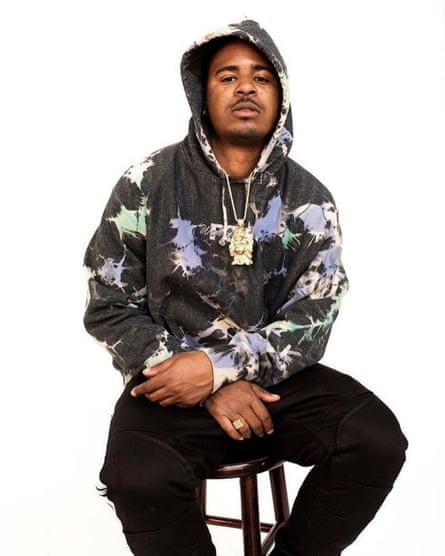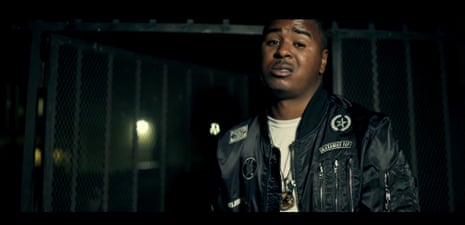The Los Angeles district attorney is prosecuting the rapper Drakeo the Ruler for a murder he didn’t commit, arguing in court that his rap lyrics, videos and collaborations are evidence of a “conspiracy”.
The case moving forward this week marks the third time Drakeo, whose legal name is Darrell Caldwell, is facing charges stemming from the 2016 murder of 24-year-old Davion Gregory. After Drakeo beat a murder charge this summer, prosecutors are launching a new trial against the 25-year-old rapper, arguing he is the leader of a “gang” responsible for the homicide. The alleged gang is his rap crew, the Stinc Team.
Drakeo is, once again, facing life in prison.
“When is this going to be over? When is it going to stop? When are they going to leave me alone?” Drakeo said in a recent phone call from the Men’s Central Jail in downtown LA, where he has been incarcerated for 18 months. “It feels like some kind of vendetta. It’s not about finding justice. It’s about taking my career from me.”
Civil rights activists across the US are closely watching Drakeo’s case, saying it’s a critical free speech test and an egregious example of racist and aggressive policing of black men and their creative expression. Experts estimate there have been hundreds, if not thousands, of similar cases of law enforcement severely punishing rappers for their songs.
“They don’t understand us. They don’t understand our culture. So they demonize us,” said Brandon Duncan, a San Diego rapper known as Tiny Doo, whose rap album was also used as a key piece of evidence in gang-related charges. “They are telling us we can’t speak, that you can go to jail for your music.”
A rising career, stalled by police
Drakeo was born in 1993 in South-Central LA and started a dance crew with his brother when he was a teenager. He got into rapping early and formed a group with friends called Too Greedy, a name they adopted in middle school. They later called themselves the Stinc Team.
Rapping was a way to make money, and stay out of the streets, he said.
On the night of 10 December 2016, Drakeo, then 23, drove with a dozen friends to a South LA party. A shooting broke out among the guests, and Davion Gregory was killed. Rumors spread online that Drakeo was involved, since his Mercedes was seen leaving the scene. Records suggest law enforcement nearly immediately began investigating him as a suspect, watching hours of his rap videos.
A month later, police raided Drakeo’s apartment, found guns and arrested him. During questioning, a Los Angeles sheriff’s department (LASD) detective, Francis Hardiman, told the rapper his music would be the “soundtrack” in a trial. “Jurors don’t like to see that stuff … your rap videos of you talking about shooting,” Hardiman said.
The detective cited one lyric, “chopper makes you go ugh” (chopper is slang for rifle), and added that a district attorney could prosecute the rapper by playing that line “over and over again”:
“I’m not a giant rap fan, just so you know,” Hardiman added.
Drakeo signed a plea deal and went to prison on a weapons possession charge. He was released in November 2017 and returned to music, earning national acclaim as a standout in a new generation of LA rap. The Washington Post called his December 2017 album Cold Devil “one of the most mesmerizing and intimate rap albums to ever float out of LA”, with a delivery that “might be the most intoxicating sound to waft across California since the arrival of Snoop Dogg”.
But LASD wasn’t done yet.
Lyrics and music videos on trial
In September 2018, Drakeo was indicted on a wide range of felonies related to the December 2016 incident, including murder, conspiracy murder, criminal gang conspiracy, shooting from a vehicle, illegal possession of a firearm and a number of attempted murder charges for other victims.
Prosecutors knew that Drakeo hadn’t killed Gregory – detectives had obtained audio recordings documenting a 17-year-old alleged gang member confessing to the killing and a man linked to Drakeo’s rap crew confessing to firing additional shots. But they argued during the trial in May 2019 that the rap crew was a criminal “gang” that planned the killing.
“As his moniker suggests, he is the leader … They rap about their crimes,” the prosecutor Shannon Cooley said.Detective Hardiman told the court he used “the greatest crime-fighting tools on earth – Google and social media” and found a music video featuring Drakeo and one of the men involved in the shooting, holding a gun that he said matched the ballistics at the crime scene.
Hardiman also cited a Drakeo lyric from a diss track in which Drakeo spoke about driving around with a rival rapper “tied up in the back”.
Prosecutors said Drakeo was plotting to kill the rapper, and that his crew ended up killing Gregory instead.
‘There is no gang, it’s a rap group’
Drakeo and his lawyers have argued that the prosecutor’s narrative was manufactured and that the analysis of his music was laughable.
“The whole point of me starting to rap is I get to rap and talk about these things and not do these things,” he told the Guardian. “And what would you rather, me rapping about stuff that I’m not actually doing, or out there doing it? It’s not real. Rapping is rhyming and pretending. It’s a persona.”
“How are you gonna tell me what I mean?” he added.
Drakeo’s lawyers said the rapper had had a previous run-in with the law (attempting to steal from a liquor store at age 16) and that some in his rap crew had been involved in petty crime, but that Stinc Team was fundamentally not a gang.
The lyric about the rival rapper stemmed from standard, harmless rap beef, his lawyers said. The rapper himself later said on social media that Drakeo wasn’t seriously trying to kill him. The DA’s own witness also said Drakeo didn’t know the shooting was going to happen.
“There is no gang. It’s a rap group. What the fuck? … I’m not a gang member and my friends are not gang members,” Drakeo said, arguing he was “at the wrong place at the wrong time”.
In July, a jury acquitted Drakeo of all murder and attempted murder offenses. The jury convicted the rapper of a single firearms possession charge and was deadlocked on two counts – criminal gang conspiracy and shooting from a vehicle.
The DA announced last month that it planned to retry the case and bring him to trial again for the two hung counts.
Hundreds prosecuted for rap: ‘Tip of the iceberg’
For the gang conspiracy charge Drakeo is still facing, LA prosecutors are relying on an opaque California penal code called 182.5, a number that now sparks fear in some rap communities. It allows DAs to prosecute people who allegedly “benefit” from criminal gang activity.
As Cooley, the DA, recently explained in court, this law is so broad, she doesn’t even have to prove Drakeo had intent or an agreement to kill anyone: “All this is saying [is] if you are an active participant in your gang, and someone from your gang commits murder, and you benefit from that murder, that you get convicted.”
The law received national scrutiny in 2014 when San Diego prosecutors accused the rapper Tiny Doo of gang conspiracy, alleging that his album that referenced gun violence provided evidence that he benefited from local gang-related shootings. He was not accused of participating in any of the crimes, and a judge dismissed the case – after he spent eight months in jail.
Like Drakeo, Tiny Doo said his life unraveled as a result.

“I live in fear every day, because they can charge me for a crime someone else committed,” the 37-year-old said, noting that the jail time badly damaged his children, whom he was raising by himself, and forced him to miss the funeral of his grandfather. He said 182.5 laws were akin to “slave codes used to take people away from their homes and their families”.
Defendants often take plea deals when threatened with this kind of charge, making it difficult to know how widely it is used. Erik Nielson, a University of Richmond professor co-authoring a book on the subject, said he’s identified more than 500 total cases since 1991 in which rap has been used as evidence, but added this was the “tip of the iceberg”.
Police rely on rappers’ music because it’s easy to watch YouTube videos and it’s often effective, said Nielson, who testified in Drakeo’s case: “You don’t have to do police work, and you get convictions .. It makes it very easy to pin crimes on people who were not involved.”
The broader problem is the law gives police wide discretion to brand anyone a gang member simply based on where they live, added Jess Jollett, an activist who worked with Tiny Doo. If the DA convicts Drakeo, it would set a terrible precedent, she said: “That means prosecutors no longer have to gather evidence. They don’t have to build cases. They can point to a name on an Excel sheet and say, go get that person.”
Drakeo said: “I will be going to trial again for literally the same thing. What was the point of me getting acquitted if they were going to say I can benefit from a murder that I didn’t do, from some imaginary gang that doesn’t exist, that I’m supposed to be the leader of? This shit is crazy.”

LASD declined to comment. Philip Stirling, the LA prosecutor taking over the case, told the Guardian he did not plan to use Drakeo’s rap music as much in the new trial and defended the continued charges, saying Drakeo was “morally responsible” for what happened and that his “gang” benefited from the murder.
“The way they can promote their gang is by having money, having girls, having status, having power, and all of that comes from this culture of violence,” he said. “Obviously, being a good rapper or being a good football player may have some relevance. But frankly, it comes down to violence.”
Condemned to solitary after a tweet
In January, Drakeo had a friend post a message on his Twitter and Instagram accounts venting his frustration at the process and impact on his career. “I NO LONGER WANNA BE A RAPPER ANYMORE. THANK DETECTIVE HARDIMAN FOR TRYNA USE MY LYRICS AGAINST ME. I WILL BE PULLING ALL MY MUSIC DOWN TOMORROW. U CRUSHED MY DREAMS #THANKDETECTIVEHARDIMAN” the post read.
Hardiman subsequently argued in court that the post and comments below it led to threats against him and requested that the rapper be placed in solitary confinement, according to Drakeo’s attorney, John Hamasaki. Drakeo had not violated any rules while locked up, Hamasaki said.
During his last 18 months in jail, Drakeo has spent eight in solitary, Hamasaki counted. He has filed a motion asking a judge to dismiss the case, and a hearing is scheduled for Thursday.
Drakeo said he does not get to leave his small cell most days. He never interacts with other inmates, he said, and he can only make phone calls twice a week.
He’s become so accustomed to being in a cell by himself that he found it difficult to go to trial and be in a larger room where everyone was looking at him: “It’s fucking with my mental state of mind,” he said.
He’s also missed the entirety of his two-year-old son’s life while in jail. Asked what he longed for most on the outside, he said, “My son, my son, my son.” He tries to sleep as much as possible to pass the time, but he said he has written at least a hundred songs and six mixtapes while inside. He’s ready to record as soon as he gets out. He thinks he’ll call one of them A Cold Day in Hell.
